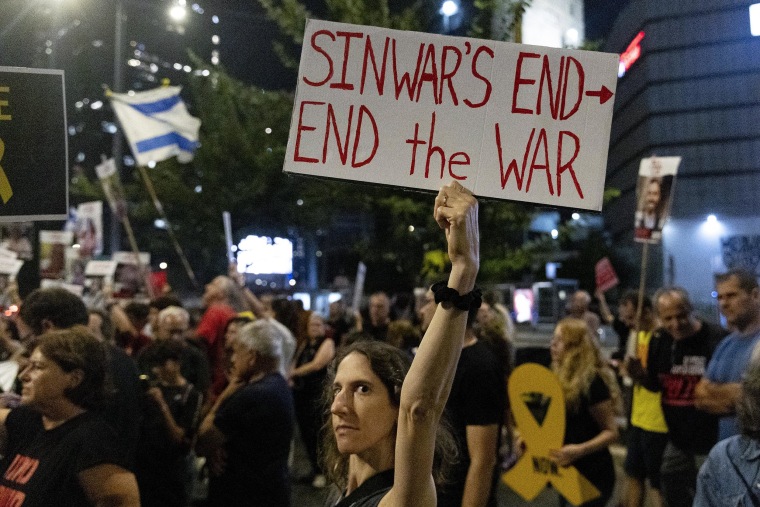Twelve months ago, Israeli Prime Minister Benjamin Netanyahu had just overseen his country’s worst defense failure ever and faced widespread anger at home and abroad.
After touting his security credentials for decades, the longtime leader was thought to be politically finished in the wake of Hamas' Oct. 7, 2023, attack on Israel.
On Friday, a day after announcing the death of Hamas leader Yahya Sinwar, the six-term prime minister's grip on power appeared stronger than it has been since the attack.
Whether coincidental or not, Sinwar's killing caps another remarkable political recovery for a man pollsters and analysts have written off many times over the years. But with the assassination of Sinwar, the last senior architect of the Oct. 7 terror attacks, in which 1,200 people were killed and around 250 taken hostage, where does this leave Netanyahu?
“It leaves him in one sense in a strong position,” said Bronwen Maddox, CEO of the London-based international affairs think tank Chatham House.

Recent polls have Netanyahu beating any serious leadership contenders, such as former-prime ministers Benny Gantz and Yair Lapid. Polling based on party also has Netanyahu’s Likud winning the most seats if an election were held tomorrow.
The most recent poll — taken by polling company Lazar before Israeli troops killed Sinwar, but published Friday in local newspaper Maariv — has Likud winning 23 of the Israeli parliament’s 120 seats, although that number has been higher in recent weeks. Likud has topped almost all reputable polls published on Israeli television stations and in newspapers since early August.
Despite the boost Netanyahu will doubtless feel as a result of Sinwar's death, the prime minister still faces some tough times, Maddox said.
“There’s going to be huge pressure on him to arrange a cease-fire deal now, from internally in Israel to get the hostages back and from right around the world including from Israel’s allies to bring the killing in Gaza, including of civilians, to an end,” she said.

If Netanyahu is feeling that pressure, that wasn't evident from his comments on Friday. “The war, my dear ones, is not yet over,” he said, adding that “we have before us a great opportunity to stop the axis of evil and create a different future” — a reference to Iran and its militant allies across the region in Gaza, Lebanon, Syria, Iraq and Yemen.
International insistence that the Israeli government ease the suffering in Gaza had already intensified in the weeks before Sinwar was killed.
This week, Netanyahu’s defense and internal security ministers received an unusually stern letter from the U.S. government threatening to review military assistance if the Israeli government continued to block essential aid from entering the Gaza Strip.
On landing in Berlin on Thursday, President Joe Biden added his voice to the many international leaders who have praised the killing of Sinwar, but he renewed calls for an end to fighting in the devastated Palestinian enclave, where local health officials say more than 42,000 have been killed.
“Now is the time to move on, move towards a cease-fire in Gaza,” Biden said.
Domestically, that may be more of a complex dance for Netanyahu, who heads a still-fragile coalition comprised of many of Israel’s most hawkish lawmakers. Steps to pause or stop operations in Gaza would most likely leave him at odds with some of the more extreme members of his Cabinet, risking a collapse in government and subsequent elections.
“The only deal on the table now is the complete surrender of those remaining from Hamas in the Gaza Strip, the release of all hostages, and the exile of the terrorists from Gaza. Until then, we will intensify military pressure,” Finance Minister Bezalel Smotrich — whom both major U.K. political parties have considered sanctioning this year — said in a post on X.
Before Hamas' attack, Netanyahu was scrambling to keep onside the disparate right-wing and religious parties in his fractious ruling coalition while facing huge protests against him.

Outside of his Cabinet and political base, one charge long leveled against Netanyahu is that he has prioritized his own political survival, playing to his right-wing base by launching wars that several erstwhile allies have described as lacking a detailed strategy.
Former Prime Minister Benny Gantz stepped down from Netanyahu’s Cabinet in June, accusing Netanyahu of standing in the way of “real victory,” while others have argued that killing Hamas’ leaders will not defeat the group.
Sinwar’s killing has only intensified the demands on Netanyahu to strike a deal. Israeli President Isaac Herzog said in an X post on Thursday that “now, more than ever, we must act in every way possible to bring back the 101 hostages.”
Many ordinary Israelis are less than optimistic about seeing an imminent return of the hostages in the wake of Sinwar’s death.
“I fear that the motives of Netanyahu’s government are never entirely pure,” Hagay Keren, 52, an attorney from a town south of the northwestern city of Haifa, told NBC News. “And that the greatest interest of Netanyahu’s government is the continuation of the war, meaning that all possibilities for bringing back the hostages now might not be fully pursued.”
There is similar skepticism among many of the families of those still being held by Hamas militants.
Jonathan Dekel-Chen's son Sagui, then 35, was taken hostage on Oct. 7. “There is no victory whatsoever in this war against Hamas without the return of the hostages,” he told NBC News. “I want to believe that Netanyahu and his government align with that understanding but their actions until now bring that… understanding into question.”
“Now that Sinwar has evidently been killed,” Dekel-Chen added, “there is zero justification for doing anything other than all means possible and necessary to get the hostages home.”
As for Netanyahu’s options from here, the seasoned political operator will be waiting to see what happens next for Israel’s most influential backer. American voters will pick their next president during the 30-day period that Israel has to comply with the demands laid out in this week's letter.
But how seriously Netanyahu takes a lame-duck Biden presidency may well depend on the result of the election, says Chatham House’s Bronwen Maddox. “My guess is, like a lot of the world, he’s waiting to see what comes out of it, but reckoning he is not going to have substantial pressure until that election.”
